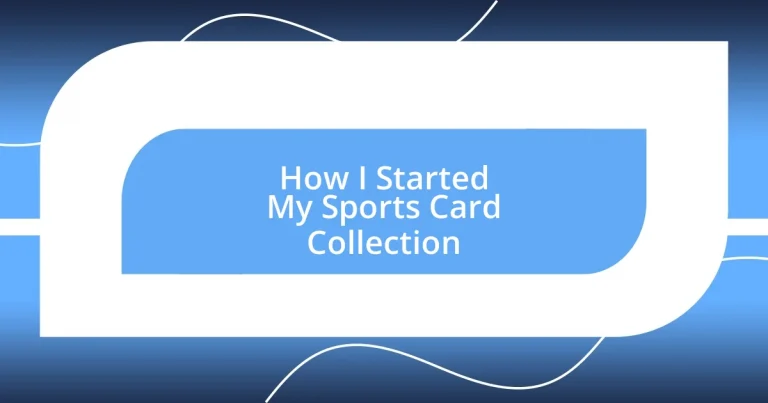Key takeaways:
- Discovering the emotional connection and stories behind sports cards enhances the collecting experience, fostering nostalgia and joy.
- Setting a budget is essential for responsible collecting, helping to prioritize goals and manage expenses effectively.
- Engaging with the collector community—both online and in-person—deepens the hobby, provides valuable insights, and creates lasting friendships.

Getting into Sports Card Collecting
Getting into sports card collecting was like stepping into a treasure chest of nostalgia for me. I remember the thrill I felt when I found a dusty box of old cards at my childhood friend’s garage sale. It was a mix of excitement and curiosity, igniting a passion I didn’t even know I had. Have you ever stumbled upon something that felt like a missing puzzle piece in your life?
As I began sifting through those cards, each one told a story—some were legendary players, while others were mere nameless faces. I never realized how a simple piece of cardboard could evoke such strong emotions, transporting me back to my favorite games and moments shared with friends. While sorting, I found myself constantly asking, “What made this card special?” It wasn’t just about the player’s stats; it was about the memories and the joy they sparked in me.
Over time, I learned that the community around sports card collecting could be as rewarding as the cards themselves. Attending local card shows, I felt an immediate connection with other collectors. Sharing stories and trading cards, I discovered that this hobby wasn’t just about the chase; it was about building friendships and lasting memories. What could be more fulfilling than forging connections while bonding over a shared passion?

Setting a Budget for Collecting
Setting a budget for collecting is crucial, especially if you want to enjoy the process without going broke. When I started, I made the mistake of letting my excitement drive my spending. I remember splurging on cards I thought would skyrocket in value, only to learn later that some weren’t worth the investment. Establishing a clear budget helps keep your passion in check and ensures you can continue adding to your collection over time.
Here are some practical tips for setting your budget:
- Determine your spending limit: Decide how much you can comfortably spend each month without impacting your finances.
- Prioritize your collection goals: Are you after specific cards, or are you open to any interesting finds? Knowing this helps in allocating your budget effectively.
- Track your expenses: Keep a record of what you purchase to avoid overspending and to assess if your investment pays off.
- Consider additional costs: Factor in expenses like protective sleeves, binders, and display cases to safeguard your cards.
- Be patient: Don’t rush into buying everything at once. Waiting for the right deals can lead to better finds and ultimately save you money.
Reflecting on my early days, sticking to a budget has allowed me to build my collection more meaningfully, ensuring each card I add has purpose and significance. It’s a journey worth savoring!

Finding Reliable Sources for Cards
Finding reliable sources for sports cards can feel daunting at first, but it’s a thrilling part of the collection journey. I’ve come to appreciate various channels, from reputable online marketplaces to local card shops. For me, it’s crucial to do a little research beforehand, such as checking reviews or asking fellow collectors for their experiences. Imagine the relief of discovering that your go-to shop has a solid reputation—it makes the thrill of purchasing even sweeter!
One of the more enlightening experiences I had was when I attended a local card show for the first time. I was amazed at the variety of vendors and collectors present, each with their own stories and insights. Interacting face-to-face allowed me to ask questions about the cards’ origins, their conditions, and their values. This personal touch often leads to finding reliable sources you might not encounter elsewhere. Have you ever purchased from a vendor you trusted? It certainly adds a layer of joy to the process!
As I navigated the world of sports card collecting, I discovered online communities and forums bursting with knowledgeable enthusiasts. Sites like eBay are fantastic, especially with their buyer protection policies. However, tread carefully—some sellers may not be as reliable as they seem. Merging both in-person and online resources equips me to find the best cards while minimizing the risks. The thrill of striking a fair deal is exhilarating, much like a home run in a game.
| Source Type | Reliability Rating |
|---|---|
| Online Marketplaces (eBay, COMC) | Moderate to High |
| Local Card Shops | High |
| Card Shows and Conventions | High |
| Online Forums and Communities | Moderate |

Organizing and Displaying Your Collection
Organizing your sports card collection can truly enhance your enjoyment of the hobby. When I first delved into organizing my cards, I realized that a systematic approach made it easier to keep track of what I had. I decided to categorize my cards by sport, then by player or set, which not only helped with organization but also turned it into a fun treasure hunt each time I went to find a specific card. Have you ever sorted something you love and felt that spark of excitement? It’s so rewarding!
As for displaying your collection, I’ve found that showcasing cards not only protects them but also brings a personal touch to my space. I’ve invested in rigid top loaders and shadow boxes, which allow me to highlight my favorite cards. Every time I walk past my display, I’m reminded of the stories behind each card—a home run during a crucial game or a Rookie of the Year moment. Have you thought about how your display can tell a story of your collection? I certainly cherish those memories every time they catch my eye.
Finally, I suggest a digital component for any collector eager to stay organized. Once I started keeping an online inventory, I could quickly reference my collection, which saved me so many headaches when browsing vendors or online forums. This method not only helps with tracking but also connects with fellow collectors who might share insights about cards I’m looking for. Plus, it’s a great conversation starter—“What’s your favorite card on your digital list?” Always sparks engaging chats!

Connecting with Other Collectors
Connecting with other collectors can really elevate the experience of building your sports card collection. I remember the first time I joined an online collector’s forum; it felt like stepping into a cozy neighborhood gather. The members were incredibly generous, sharing tips and even stories about their most prized possessions. Have you ever felt that sense of camaraderie from a shared passion? It’s such a powerful feeling!
In-person meetups also have their own magic. At my local card shop, I connected with a seasoned collector who took the time to teach me about the finer points of grading cards. His enthusiasm was contagious, and before I knew it, we were swapping cards that meant a lot to us. There’s something enriching and deeply personal about meeting someone who shares that same spark of interest. Can you recall a time when you learned something valuable from another collector? It’s that kind of exchange that makes our hobby feel like a community.
Additionally, social media has become an invaluable tool for connecting with other enthusiasts. I’ve found specialized groups where collectors share their latest acquisitions, trade cards, and sometimes even host giveaways. I even participated in a virtual card show that expanded my network tremendously. What’s more, the excitement of showcasing a find and receiving feedback from fellow collectors is simply unmatched. Have you thought about sharing your collection online? It opens up a whole new world of connection and appreciation!














